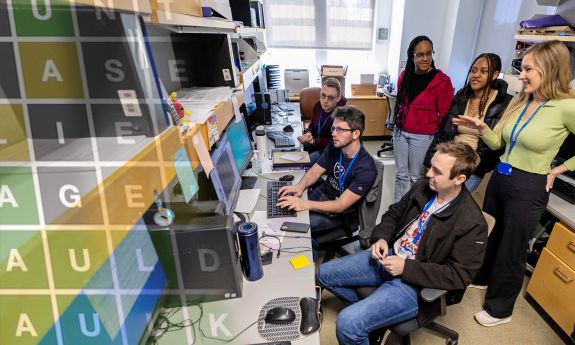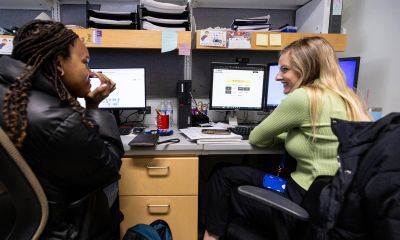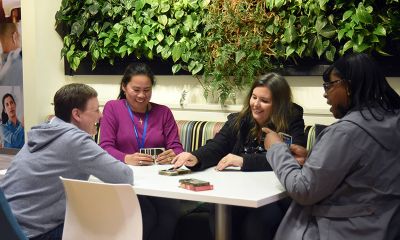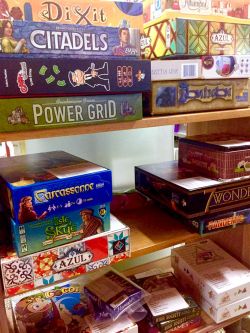Power of Play: Duke Employees Build Bonds Through Games
Challenging games and word puzzles sharpen minds and team connections

After some debate, they discover it’s “wind” like “a breeze,” and it matches with others that are the back-half of compound phrases starting with “second.” Second-guess, second-fiddle, second-nature, second-wind. Cracking that pattern helps the lab solve the entire New York Times Connections puzzle in about four minutes.

Each day, the lab takes a break from the dense study of antibody responses to HIV-1 to inform vaccine design to play a series of word games like Wordle, Connections and Semantle. As the old saying goes, co-workers who solve word games together get along better (or something like that).
“These games have really been a way to bond as we have very little in common apart from working together,” says Sommer Holmes, a Lab Research Analyst. “They’ve helped new members integrate and fostered our social dynamic, making us more communicative and collaborative – important factors for lab work, especially.”
Playing word games – or simply games, in general – can help departments and teams bond, whether it’s by competing against each other for bragging rights or collaborating for answers. And just as importantly, the practice can keep minds sharp and improve work performance.
Cross-Training Your Brain

P. Murali Doraiswamy is a Professor of Psychiatry and Medicine at Duke University, and a researcher at the Duke Institute for Brain Sciences. He says there’s a concept called “cognitive reserve” that theorizes people might be more resistant to age-related, degenerative changes if they work to stimulate more connections within the brain. You do that through challenging your mind and seeking new experiences.
Then it’s like being in an area with a lot of cell phone towers, he says, and your phone has a very good signal that rarely drops.
Doraiswamy likes to remind people that every aspect of our cognition can be strengthened, much like a muscle.
“As you're moving from one area to another, even if there's a thunderstorm in one area, you're unlikely to have a lost signal because of the density of the network,” Doraiswamy says. “It’s sort of like that in the brain.”
Word games, crossword puzzles and Sudoku “cross train” the brain, building new connections in different ways, Doraiswamy says.
Though it’s one of the greatest benefits, the advantages of playing games in the workplace go beyond staving off cognitive decline, too.
The Team Bonders

Duke Clinical Research Institute created a weekly event series called “Tuesdays Together” in late February to help bring colleagues together – and games are often at the heart of what they call their “work+engage” endeavor.
The first event was a DCRI trivia challenge, then scavenger hunts and most recently, “Uno-palooza” – where both onsite and remote workers were dealt into a tournament of the card game.
“It breaks you out of that work element by potentially getting to see another side of a person – you get to see their playful side, you get to see maybe their competitive side,” says Jennifer Riley, a Senior Communications Specialist. “It helps in that spirit of playfulness to engage people and get them to work together in ways that they might not have in the past.”
Staying Sharp Solo

Laura Lane has a routine: She starts each day with The New York Times’ Spelling Bee game, hoping to achieve “Queen Bee” status before she moves on to Connections. Then she’ll make her way to Wordle, and then the Solitaire Daily Challenge. Finally, she’ll end with one last word game called Waffle.
“That’s a good morning,” says Lane, a Sector Director in Fuqua School of Business.
Lane prefers to work out the puzzles on her own rather than competing against or collaborating with co-workers, though she’s been known to ask colleagues for advice if she’s still stuck and has to take another stab at solving something at lunchtime.
She knows puzzles and word games are good for her brain, but keeping sharp isn’t the primary reason she makes them a part of her daily routine.
“I mean, I'm 59, so I hope it does,” she says. “But mostly I do the word games because I enjoy it.”
The Fuqua Games Collection
Around 2018, the MBA Games Club at Fuqua School of Business made an unusual request: They wanted the Ford Library at Fuqua to amass a collection of board and card games.

Amy Brennan, a Collection Services Librarian, wasn’t sure what to expect when the library began adding strategy and team-building games.
“We thought it was going to be a very limited-use collection, and we didn't really inject a lot into it to start,” she says. “But it keeps getting more popular and checked out every month. So, we just keep adding to it.”
The Ford Library now has about 60 titles in its collection, with everything from Catan to Exploding Kittens to something called Racoon Tycoon. Any staff, faculty or student at Duke can check out three games at a time. Through the first four months of 2024, games were checked out 428 times.
Library staff, itself, has used the games for team-building, too, playing a challenging word game called Just One.
“Doing team-building exercises with games is important, and game theory in business is a big thing,” Brennan says. “Because it kind of works. Teaching people in a fun way is part of what we're doing.”
Send story ideas, shout-outs and photographs by writing working@duke.edu.
Follow Working@Duke on X (Twitter), Facebook, and Instagram.